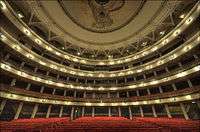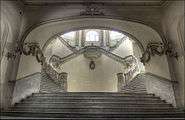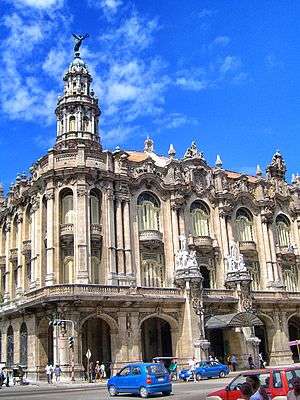Gran Teatro de La Habana
| Great Theatre of Havana | |
|
A view of the Great Theatre | |
| Former names |
|
|---|---|
| Location | 458 Paseo del Prado 10600 Havana, Cuba |
| Owner | National Government |
| Type | Opera house, Performing arts center |
| Genre(s) | Ballet, Opera, Flamenco, other |
| Capacity | 1,500- The Garcia Lorca Auditorium |
| Construction | |
| Opened | 1915 |
| Renovated | 1914, 2004 |
| Architect | Paul Belau |
| Tenants | |
|
National Ballet of Cuba (1950-present) International Ballet Festival of Havana (1960-present) | |
The Gran Teatro de La Habana Alicia Alonso[1] (English: "Great Theatre of Havana Alicia Alonso") is located in the Paseo del Prado in Havana, Cuba. It is located in a building known as the Galician Centre of Havana, constructed to serve as a social center for Galician immigrants to Havana. The theatre has been home to the Cuban National Ballet and, on its main stage, to the International Ballet Festival of Havana. It facilities include theatres, a concert hall, conference rooms, and a video screening room, as well as an art gallery, a choral centre, and several rehearsal halls for danzarias groups and dance companies.
Construction history

The Teatro Tacón had occupied part of the site for decades. Its grand auditorium hosted such European artists as Enrico Caruso and Sarah Bernhardt. During the first years of Cuban independence when thousands of immigrants arrived in Cuba from Spain, a new building was constructed around it, preserving the original theatre.[2] Originally known as the Galician Centre of Havana, the building is decorated with a stone and marble statue as well as sculptures by Giuseppe Moretti, representing allegories depicting benevolence, education, music and theatre.
The construction of this building, financed by donations of Galician emigrants, began in 1908 and it opened in 1915 with an opera season offered by important artists of the period. In 1985, at the initiative of the prima ballerina Alicia Alonso, the building was renamed the Great Theatre of Havana.
Following extensive renovations, the theatre has reopened on January 1st, 2016 and renamed to honour the Cuban prima ballerina assoluta Alicia Alonso.
The theatre today
The principal venue is the García Lorca Auditorium, with seats for 1,500; it provides a stage for the Cuban National Ballet Company, as well as for other dance and musical performances. During the 19th and 20th century performances took place on its stage by artists of the highest rank, such as Ole Bull, Enrico Caruso, Fanny Elssler, Jenny Lind, Anna Pavlova, Antonia Mercé, Ruth Saint Denis, Ted Shawn, Teresa Carreño, Vicente Escudero, Maya Plisetskaya, Clorinda Corradi, Sarah Bernhardt, Carla Fracci and Alicia Alonso, as well remarkable companies such as the American Ballet Theatre, the Royal Winnipeg Ballet, Antonio Gades ballet, the Ballet of the Colón Theatre of Buenos Aires, the Ballet Folclórico of Mexico, plus many other highly respected artists and ballet companies of the time.
The theatre also presents seasons of the Centre Pro-Art Lírico with its performances of operas, zarzuelas, operettas and concerts, plus the Spanish Ballet of Havana and performances by the Centre of Promotion of the Dance (PRODANZA). In addition, it is the location for the "Arte Lírico", the "Practical Courses of the National School of Ballet" ("CUBALLET"), the "Track of Spain" Festival, and as well the International Festival of Scenic Oral Narration, and several other festivals.
Gallery
- Images of the Great Theatre
.jpg) Front façade
Front façade Interior
Interior Stage
Stage
References
- ↑ http://www.balletcuba.cult.cu
- ↑ Estrada, Alfredo José (2007). Havana: An Autobiography. New York: Palgrave Macmillan. pp. 100–1.
External links
| Wikimedia Commons has media related to Gran Teatro de La Habana. |
- El Gran Teatro de La Habana es una de las más importantes instituciones culturales de América Latina.
- Radio Habana Cuba Article on The Great Theatre of Havana at the Wayback Machine (archived May 18, 2008)
- The Great Theatre of Havana at the National Ballet of Cuba homepage
Coordinates: 23°08′13″N 82°21′35″W / 23.136828°N 82.3596042°W
